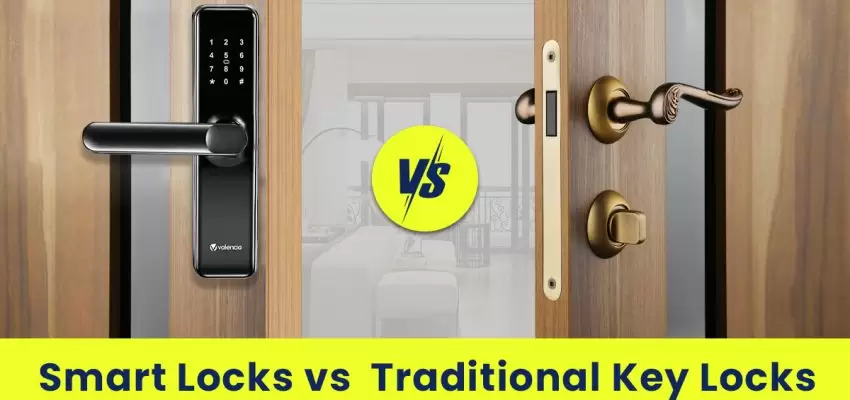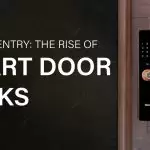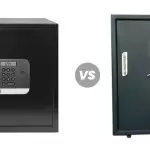For generations, the cold metal of a key sliding into a sturdy lock has brought comfort and security. Such physical barriers felt like stalwart protectors – immutable and uncomplicated. Yet, as our homes fill with interconnected devices, traditional locks now seem almost antiquated.
Post your Requirement
In their place come smart locks, embracing both convenience and risk. A quick tap on your phone can now grant access from afar, integrating home control into one simplified system. However, with such capabilities come dependencies – on stable connections, robust encryption, and regular updates. Eventually, a reckoning emerges – are these complex digital guardians truly safer than analog locks of old?
And so the modern homeowner stands at a crossroads, grasping the promise of innovation yet clinging to the familiarity of the past. Smart locks envelop us in automation’s allure and the sheen of the future. Meanwhile, traditional locks beckon with nostalgia and hard-won trust. We toggle between these worlds, seeking the right balance of simplicity and features tailored to our unique needs.
Both options aim to provide security, through surprisingly similar means. But expectations transform, valuing things like custom access schedules, notification alerts, and voice activation as necessary conveniences rather than novel indulgences. Ultimately the decision reflects a new paradigm where reliability and practicality contend equally with versatility and potential. And within this evolving landscape, homeowners must navigate between the comfort of the tried and true and the excitements of the cutting edge.
Smart Locks
Convenience Meets Caution with smart locks in the following ways:
- How They Unlock Your Door: Smart locks use Wi-Fi and phones instead of keys. Tap the app, and they unlock from anywhere. Some also have fingerprint scanning or cameras. They connect to smart speakers too, so you can say “Hey Google, open my front door.” Handy but complex. They must be installed correctly, protect data, and keep batteries charged.
- Complete Automation: The best thing about smart locks is how they work with other smart home tech. You arrive with arms full of food, and yell “Open sesame!” Locks click open. Then motion detectors see you enter, flick on lights, and adjust the thermostat perfectly. One tap as you hop into bed locks up kills lights. So helpful! But it only works when the internet, power, and batteries are humming.
- New Digital Dangers: Being online is convenient but risky too. Hackers can steal logins and disable or exploit systems. Outages cut off access entirely until fixed. And with accounts, data breaches, and updates to manage, you feel less fully in control versus a plain old key. For the ultra-tech-savvy, smart locks do more good than harm overall. But uncertainties linger about just how safe interconnected systems can ever be.
Traditional Locks
Traditional Locks provide security in the following ways:
- Keys, Tumblers, and Bolts – The Originals: Those good old locks, proven by time. A precisely cut key lifts metal pins inside old-fashioned locks to slide the bolt. Beautiful in their simplicity after thousands of years of keeping things secure. No fancy processors. Just shaped metal and springs doing their job.
- Pure Mechanical Protection: The best thing about traditional locks is no reliance on electricity, the internet, or accounts. They work 24/7, rain or shine, off-grid or on. Once installed with a screwdriver, no maintenance is needed – just turn the key. No learning curve either – everyone understands the keys. Time-tested, uncomplicated security delivering general dependability if not remote access perks.
- Limitations of Analog: What you gain in resilience with traditional locks, you lose in features. No apps obviously, plus no way to track entries or rekey instantly when keys go missing. And anyone can still pick, pry, or smash these locks same as old times. Physical keys also scratch, stick, and get stolen constantly. Basic protection yet modern life demands more.
Smart Locks vs Traditional Locks
Let’s break down the differences in simpler terms:
|
Feature |
Smart Locks |
Traditional Locks |
|
Access Mechanism |
Keypads, Biometrics, Smartphone Connectivity |
Physical Keys |
|
Connectivity & Automation |
Integrates with Smart Home Platforms and allows Remote Access |
No Automation, Requires Physical Interaction |
|
Cost |
Moderately Higher |
Generally Lower |
|
Key Management |
Digital Key Issuance, Revocation, Entry Logs |
Physical Keys, Manual Tracking |
|
Installation Complexity |
May Require Professional Installation, Compatibility Checks |
Simple Installation with Basic Hardware |
|
Power Source |
Requires Power Source (Usually Batteries) |
Operates Mechanically, No Power Requirements |
|
Security Features |
Advanced Encryption, Two-Factor Authentication |
Vulnerable to Picking or Bumping, Traditional Mechanisms |
Finding the Right Fit
No definitive winner emerges in security or reliability alone between new smart and old mechanical locks. Both deter break-ins generally. The right fit comes down to living priorities – convenience vs simplicity, automation vs autonomy.
If you want full integration with other smart home gear, mobile access, notifications, e-keys, and such, then smart locks justify the cost and complexity. Otherwise, as a set-it-and-forget-it physical barrier, traditional deadbolts get the job done on a budget.
In the end, reflect on your habits, needs, and comfort with technology when finding the locks that protect your domain. Evaluate options not by technical merits but by how seamlessly they help secure your unique lifestyle.
FAQs
Q-1. Are smart locks as secure as traditional locks?
A-1. Smart locks offer enhanced encryption but also potential hacking risks that traditional locks don’t have. Both deter most break-ins when properly installed.
Q-2. What happens if the smart lock battery dies?
A-2. The smart lock will become inoperable until the battery is replaced. Traditional mechanical locks don’t require battery power to function.
Q-3. Can you add and delete digital keys on a smart lock?
A-3. Yes, most smart locks allow conveniently adding and removing access for different digital keys through the app. This is not possible with a traditional lock.
Q-4. Do smart locks require professional installation?
A-4. Some do. It depends on the model – many are made to retrofit onto existing door hardware without much hassle. Always check compatibility first.
Q-5. Is a smart lock worth the higher price over a traditional lock?
A-5. It depends if the remote access, automation, and integration with other smart features are worth it for your needs. For basic security alone, traditional locks can be the better value.























Post A Comment